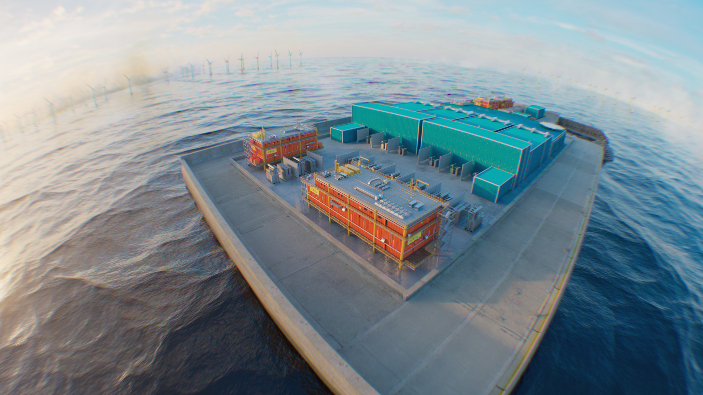DEME and Jan De Nul to build world's first energy island

Photo Credit: Elia.
TM EDISON, a joint venture between DEME and Jan De Nul, has won the tender for the construction of Princess Elisabeth Island, the world's first artificial energy island. The project, awarded and spearheaded by the Elia Group, a Belgian transmission system operator for high-voltage electricity, is intended to advance Belgian decarbonisation goals and reduce short term dependence on fossil fuels.
The contract covers relevant design elements and the subsequent construction of the artificial island 45km off the coast of Belgium in the Princess Elisabeth wind zone.
Construction of the island's foundations will start in early 2024 and is estimated to conclude in August 2026. Concrete caissons filled with sand will form the contours of the island, and will be built and installed from 2024-2025. The construction will prioritise safety and the lowest possible carbon footprint, while accounting for the rising water level of the North Sea.
Upon completion of the foundations, the base of the island will be raised and prepared for the construction of high voltage electrical infrastructure, the contract for which will be awarded at a later date. This infrastructure will connect to the new offshore wind farms and the Elia onshore grid.
The energy island has received funding from the European Covid Recovery Fund, with the Belgian government awarding the island a grant of approximately €100 million. Combining direct current (HVDC) and alternating current (AC) (HVAC), the island's high-voltage infrastructure will serve as a hub for future interconnections with Great Britain (Nautilus) and Denmark (TritonLink), leading to a more integrated European offshore electricity grid.
While the advice given in this editorial content has been developed using the best information available, it is intended purely as guidance to be used at the user’s own risk. No responsibility is accepted by CEDA or by the Intent Communications Ltd or by any person, firm, corporation or organisation who or which has been in any way concerned with the furnishing of information or data, the compilation, publication or any translation, supply or sale of this Guidance for the accuracy of any information or advice given herein or for any omission herefrom or from any consequences whatsoever resulting directly or indirectly from compliance with or adoption of guidance contained therein even if caused by a failure to exercise reasonable care.